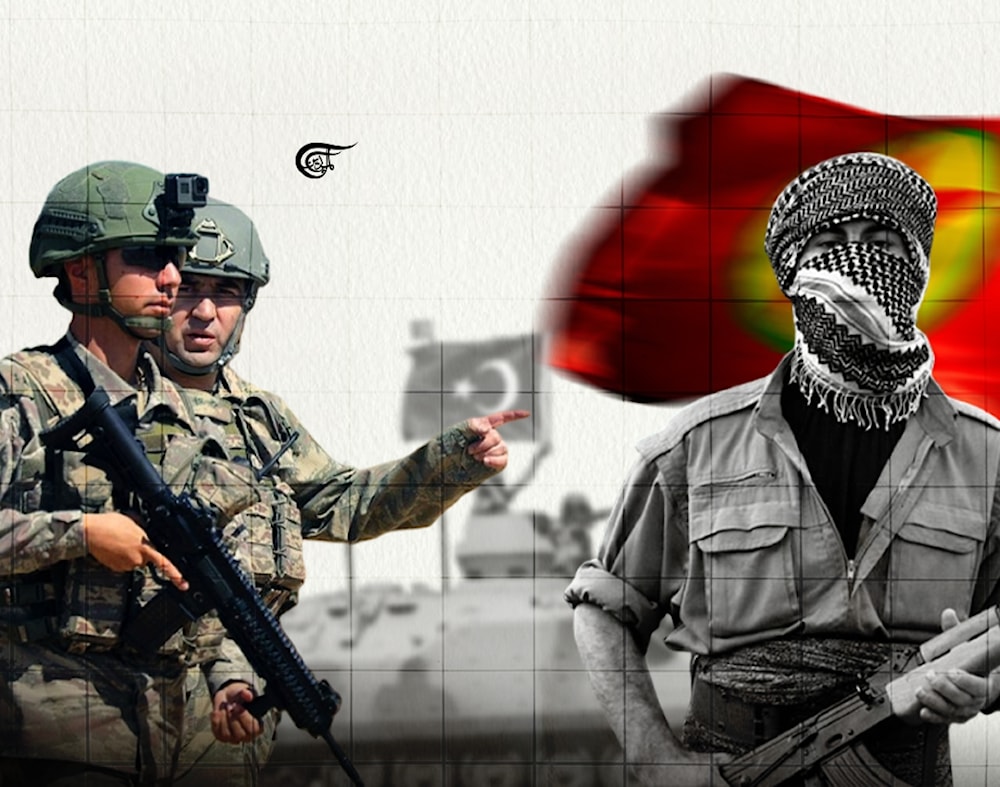Beyond the Turkiye-PKK ceasefire
The ceasefire should be seen as an important pathway toward a historic PKK Congress on formalizing the group’s transition.
-

Beyond the Turkiye-PKK ceasefire (Illustrated by Batoul Chamas; Al Mayadeen English)
Given decades-old schisms between the Turkish state and the PKK, it is clear that any break in violence could come off as a much-needed sigh of relief for both sides. Countless losses – both material and human – have been witnessed on both sides of the aisle, and there have been questions about Ankara’s ability to negotiate consistently with the PKK. Now as the Kurdistan Workers' Party (PKK) signals commitment to action through a ceasefire and calls for the release of its jailed leader Abdullah Ocalan, there is solid reason for cautious optimism. Here is why.
First, there is a core interest on both sides to prioritize reconciliation and break with the past. Peace engagements over the years have left the door open to a more ‘formalized’ dissolution of PKK and tested Turkiye’s resolve to follow through on its facilitation intent. 2015 is a proof point when the PKK sought to advance a commitment to ceasing hostilities. The spotlight fell on Ankara to also dial down threat perceptions for the arrangement to endure. From where things stand today, it will serve Ankara well to prevent daily reconnaissance flights and cease targeted operations against the PKK for a key reason: to preserve the sanctity of the breakthrough ceasefire. If any form of hostilities carries on, it challenges optics for tangible negotiations and could prepare the ground for soaring trust deficit. Instead, the focus should be on supporting conditions that enable Ankara to stay its course on the ceasefire and also help the PKK’s leadership to safely convene and promote its transition – as envisioned by the group.
Thus, the ceasefire should be seen as an important pathway toward a historic PKK Congress on formalizing the group’s transition. It isn’t enough for any stakeholder to push for the unconditional surrender of weapons when the mechanism leading to such change is refused significant priority. The convening of the Congress is a case in point: hard security guarantees from Ankara and a secure environment for all PKK leaders to gather are necessary for a united front on long-term peace.
To many, that sense of PKK autonomy could ultimately demand the release of Ocalan by Ankara, whose centrality to PKK decision-making is considerably acknowledged. From Ankara’s viewpoint, this will serve as a critical gesture that demonstrates its willingness to go the extra mile for PKK. It should understand that negotiations are a two-way street and that simultaneous operations against the PKK are undermining its own resolve to see long-term peace prevail.
Given the complexity of the four-decades-old insurgency, Ankara should be careful in assuming what the future of Kurdish forces should look like. For instance, Ocalan did not mention specifics about Kurdish forces in the region as he made his call for dissolution. By pressing for a ‘one-size-fits-all’ approach to the PKK and its affiliates, Turkiye risks overruling what the group’s own Congress is keen to establish as its consensus. Ground realities suggest negotiations and declarations may not work in tandem.
On helping Syria shape its post-war future, Ankara needs to put a premium on Damascus’s own autonomy and what the leaders see as central to national empowerment. In a similar spirit, it serves its interests to respect the improvement of political and economic ties between Iraq’s Kurdish-dominated region and Turkiye. From where things stand, it would help the ongoing reconciliation process if Turkiye demonstrates its willingness to dial down strikes on Iraqi soil. This is important because the continuation of aggression, despite an air of delicate but possible PKK-Turkiye reconciliation, could present a gulf between Ankara’s stated intent on regional stability and actions on the ground. Thus, for better political and economic ties between Kurdish-populated regions of Iraq and Turkiye, an end to all forms of violence is a central consideration. This can help demonstrate mutual regard for sovereignty, the liberties of people, and collective resolve against collateral damage.
Given that Ankara has launched several initiatives in the past to reconcile with the Kurds within its territory, there is a need for genuine facilitation on home soil to communicate a sense of seriousness beyond its borders. That domestic resolve can spare the region from heightened risks, such as Ankara’s targeting of SDF (Syrian Democratic Forces) coordinates in al-Hasakah on February 26. Closing ranks can present a united front on post-ceasefire peace: a collective aspiration for all parties involved.
Thus understood, only through concrete measures that comprehensively reconcile the interests of Ankara, Kurdish-populated regions, and the PKK, a pathway to stability may emerge. The ceasefire should be seen as an important contributor to that endeavor.
But with regional dynamics come domestic considerations. There is ample space for Ankara to pursue reconciliation on its soil, and sincere consultations with the pro-Kurdish Peoples' Equality and Democracy Party (DEM) could set an encouraging precedent for internal cohesion.
This could prepare the ground for Ankara to walk its talk amid the ceasefire, especially as the PKK looks for conducive conditions to proceed with its own Congress and contemplate disarmament.

 Hannan Hussain
Hannan Hussain
 5 Min Read
5 Min Read











